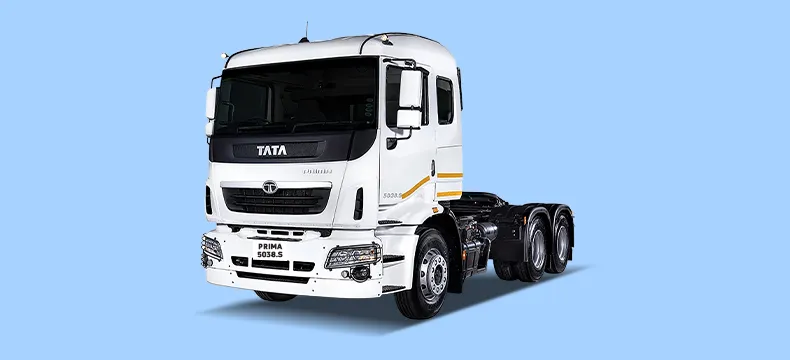4 Dec 2025

How Pickup Load Capacity Affects Fuel Efficiency: A Complete Guide
- Tata Motors
- 18 Nov 2024
- COMMERCIAL VEHICLE
Introduction
Fuel efficiency is a crucial factor when operating a pickup truck, especially if your work involves hauling heavy loads. Pickup load capacity plays a significant role in determining how fuel-efficient your truck is. In this complete guide, we will explore the relationship between pickup load capacity and fuel consumption. You will also learn some practical tips to maximise fuel efficiency. This guide will give you enough information to make an informed decision while picking the pickup truck for your business.
Understanding Pickup Load Capacity
Pickup load capacity refers to the maximum weight a truck can carry in its cargo bed without risking damage to the vehicle or compromising its safety. This capacity is crucial for determining how much cargo you can safely transport. The goods can range from construction materials, and tools, to e-commerce shipments. You can find the pickup load capacity guide and information mentioned in the vehicle specifications section. Exceeding the load capacity limit can have serious consequences for both safety and fuel efficiency.
How Pickup and Fuel Efficiency Works
There is a direct relationship between the pickup load capacity and fuel efficiency. Here's a closer look at how this relationship works:
-
Increased Load equals Increased Fuel Consumption
When a truck operates at or near its maximum pickup load capacity, the engine burns more fuel to generate the necessary power for moving the extra weight. As a result, there is an increased fuel consumption.
-
Aerodynamics and Load
Carrying a heavy load can also affect the aerodynamics of the pickup truck. When you overload a pickup bed, it can create more drag, especially if the cargo extends above the truck's cabin. This means the truck must work harder, which reduces the fuel efficiency.
-
Acceleration and Braking
A heavily loaded truck requires more power to accelerate and more energy to brake. Such frequent stop-and-go driving with a full load increases fuel consumption due to the extra energy required to overcome this inertia.
-
Tire Pressure and Rolling Resistance
When the pickup truck carries more weight, the tyres experience greater rolling resistance. This makes the truck less efficient. Also, carrying heavier loads leads to under-inflated tyres, which further reduces fuel efficiency.
-
Strain on Engine
Hauling more weight for extended periods puts extra strain on the engine and other mechanical components. This leads to inefficiencies over time. Such stress reduces fuel economy and shortens the lifespan of critical parts, increasing the cost of repairs.
Tips for Maximising Fuel Efficiency When Hauling Loads
While load capacity can affect pickup truck fuel efficiency, there are several steps you can take to mitigate the impact and ensure your truck operates efficiently. Here are some practical tips:
-
Distribute Weight Evenly
Ensure that the weight in your truck bed is evenly distributed. An uneven load causes the truck to work harder, particularly during turns and acceleration. Proper distribution improves handling and optimises fuel consumption.
-
Inflate Tires to the Correct Pressure
Before loading up your truck, check the tyre pressure. If the tyres are under-inflated, they create more rolling resistance, which negatively impacts fuel efficiency. If this is the case, inflate the tyres to the manufacturer's recommended levels based on the load you're carrying.
-
Avoid Idling
Idling or extended wait times in between deliveries consume fuel without any mileage in return. Hence, if you are loading and unloading your truck and expect to wait for several minutes, switch off the engine to save fuel.
-
Reduce Wind Resistance
Try to avoid stacking cargo higher than the roof of the truck. High loads create wind drag, which increases fuel consumption. When possible, use a tonneau cover to improve aerodynamics when the bed is not fully loaded.
-
Prioritise Regular Maintenance
Keeping your pickup truck in peak condition will help maintain optimal fuel efficiency. Regular engine tune-ups, oil changes, and tyre alignments are ways to ensure your truck operates efficiently, even with heavy loads.
A Fuel-Efficient Pickup Truck for Your Business Needs
If you are in the market for the most fuel-efficient pickup truck, the Tata Motors Yodha 1500 RHD is an excellent option. It delivers strong performance with its rugged durability and fuel-efficient design. It is equipped with a 45L direct-injected, turbocharged, and intercooled diesel engine that produces 85 HP at 300 RPM and a peak torque of 250 NM. Its payload capacity of 1,500 kg is the best in the pickup truck category. The suspension system with leaf springs and shock absorbers reduces friction and makes it comfortable to drive and carry the load. Also, the vehicle handles an overall 1.85 tonnage, ample for a variety of applications.
Conclusion
Having learned the importance of fuel efficiency balanced with load capacity in this pickup load capacity guide, you are prepared to pick the right pickup truck for your needs. As we've discussed, the heavier the load, the greater the fuel consumption due to increased strain on the engine. By following the tips outlined in the guide, you can help mitigate this impact. Moreover, investing in a fuel-efficient pickup truck like the Tata Motors Yodha 1500 RHD ensures that you strike a balance between load and fuel economy.
FAQs
Do all pickup trucks have the same load capacity?
No, not all pickup trucks have the same load capacity. Each truck has a different rating based on its design, size, and purpose. Generally, smaller trucks can carry less weight than larger ones.
What is the best way to load my pickup truck for fuel efficiency?
To improve fuel efficiency when loading your pickup truck, you can distribute the weight evenly across the bed. Also, keep heavier items closer to the cab and lighter items towards the tailgate. Other ways are to avoid overloading and reduce wind resistance.
Is it better to carry items inside the cab or in the truck bed for fuel efficiency?
Generally, carrying items inside the cab can be more fuel-efficient, as it reduces wind resistance. However, make sure to secure all items properly to ensure safety.
- Tags



















